Lebanese business people back protesters’ call for change
Lebanon has faced five weeks of anti-government protests, driven by widespread anger at corruption among the sectarian politicians who have governed the country for decades. The protesters are now demanding that they go.
So what are the views of Lebanon’s business community, both in the country itself and abroad?
The Lebanese diaspora is playing a key part in the protests, organising vigils across the world, and its economic influence is very significant – remittances to Lebanon last year were more than $7bn (£5.4bn).
Dana Trometer is in her 40s, and runs a London production company. Although she’s been in the UK since the 1990s, she is fully involved in the events that have been rumbling through Lebanon since mid-October, when a proposed tax on WhatsApp voice calls helped trigger wider protests over economic mismanagement, corruption, unemployment, and poor public services.
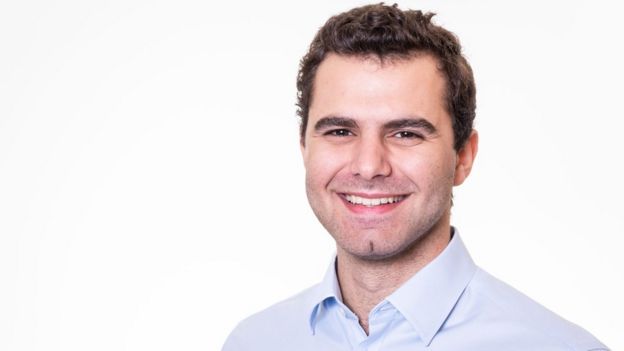
Also at our breakfast meeting in a London cafe are fellow UK-based Lebanese business leaders, Mohammad Koussa and Danny Hakim. They both have strong commercial and family links to Lebanon, and their own ideas on how they want it to change. Mohammad runs a food wholesaler in Lebanon and another business in the UK, while Danny is an ex-banker who owns a tech start-up.
Danny is very excited about the protests: “I remember seeing Instagram just blow up in 90 plus cities in 35 different countries within 24 hours, that unity has never been felt before. I think this is a revolution of the young ,and the women, and love, really.”
Dana is a more cautious; she remembers Lebanon’s bitter civil war between 1975 and 1990. Her parents’ generation went on the streets and protested, she says, “hoping that they wouldn’t have a civil war, and then they did”.
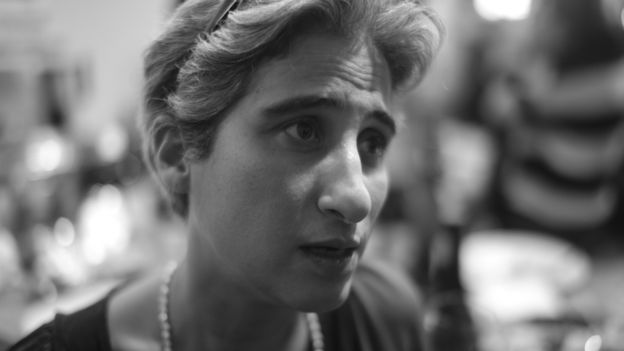
But even she agrees that “this time it is different” and that the Lebanese are not going to accept the status quo any more, “there’s no way, there’s no return”.
All are immensely proud of the non-sectarian nature of the protest – and in Lebanon that matters hugely. The country has a complex communal make-up, with Shia and Sunni Muslims, and Maronite Christians the three biggest religious communities.
- How did Lebanon get into such a deep crisis?
- The voices and faces of Lebanon’s protests
- A Lebanon feeling reborn
- How Lebanon got into so much debt
- Lebanon scraps WhatsApp tax as protests rage
This is institutionalised in its political organisation; parliament’s seats are divided evenly between Christians and Muslims, the prime minister must be a Sunni Muslim, the president a Maronite Christian, and the speaker of parliament a Shia. Critics say this keeps the ruling caste in power and allows politicians to put their interests above those of the state.
The economy and falling living standards have been at the heart of anger bubbling up among the Lebanese. Mohammad Koussa says that when he started running his business seven years ago Lebanon was planning to have a duty free arrangement with the EU.
“Imagine what that gave me as a business,” he says. “I was looking for products to bring from Europe, and planning on that to sustain. Now they say there’s a trade deficit [and] ‘we need to stop this’. They want to close the country towards trade. How does that make sense? There is no economic policy vision.”
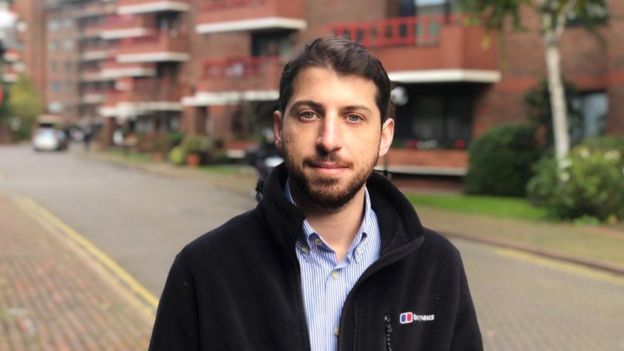
Danny Hakim agrees, citing his own experience. The government wanted to boost Lebanon’s tech sector and bring back experiences expats, but there are problems with that, he says.
“In the UK to incorporate a company, it costs £10 and takes two hours. In Lebanon the cost is in the thousands, and there are 10 different sign-offs you need. How am I going to justify that?”
In Lebanon itself, there is a similar feeling of frustration with the country’s economic mismanagement.
Aya Issa is one of the owners of fuel importer Issa Petrol Trade. Since the protests some banks have been imposing limits on sending US dollars abroad, a real issue for her as she works with international suppliers. She says these informal capital controls are “really dangerous” because they are not regulated by the central bank.
The protests themselves started following a currency crisis in the country. This was caused by a shortage of US dollars in the country’s commercial banks. When the importers of wheat and fuel demanded to be paid in dollars, bakeries and petrol station unions called strikes.
Former financial journalist and founder of Triangle Development consultancy, Sami Halabi, says there is a “conflict of interest” as key politicians “own banks which hold a large portion of the public debt”. He adds: “The ruling class sneaks in indirect taxes on things like utility bills and the infamous WhatsApp tax. The economic structure works against people’s interests.”
He is not the only one criticising the banks’ role in Lebanon’s economic crisis. Many protesters have staged sit-ins in front of the central bank and major private sector ones. Yet Nassim Ghobril, chief economist at Lebanon’s third largest bank, Byblos, feels that the sector has been unfairly picked on.
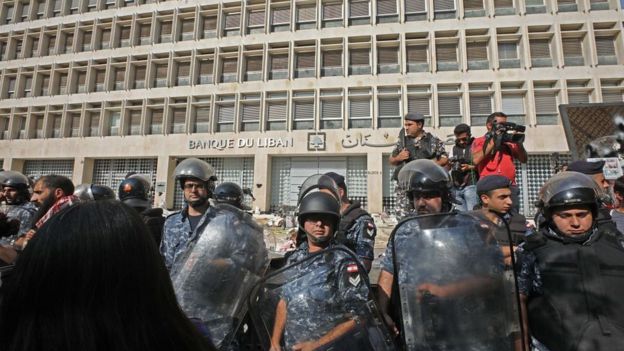
Lebanon’s banks, he says, have been “assuming the responsibility, for the past 25 years, for the currency, stability of the economy, and therefore social stability,” He says he would love to see the political class do the same – finally.
With Lebanon’s official unemployment rate for under-35s now 37%, it’s no surprise that young people have been at the centre of the protests, Sami Halabi says as an employer he is inundated with applications from overqualified jobseekers
“The country only creates about 3,000-4,000 proper high knowledge, high value added jobs. As a young person today, you are extremely angry because your ambitions far exceed what is available in the market.”
Back in London, I ask Dana, Mohammad and Danny where they think Lebanon will be in a year’s time.
“I think that we’re in a vicious loop, where we think the economy is crashing and therefore our behaviour would actually speed that up,” says Mohammad.
He thinks many would make different financial decisions if they believed that trustworthy politicians were governing, and that would get the economy moving.
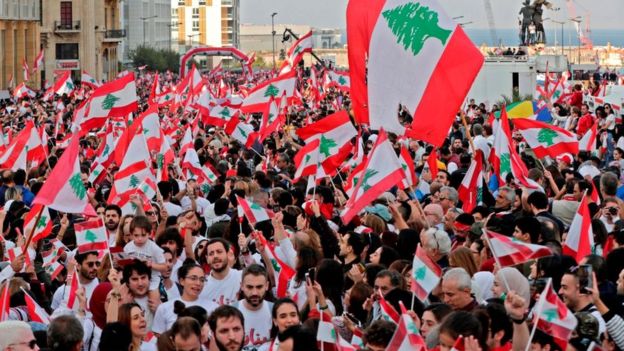
Politicians, people, banks, savers must stop the blame game, he says. “After such a beautiful revolution of unity and innocence, if hope is broken it is going to be dramatic.”
“Are we going to be crushed again?” is a question on Dana’s mind, but she goes on to say that “we have broken already the big stigma – the political affiliation. The unity has been stronger.”
Danny’s focus is on the role the Lebanese abroad can play. “If we play our hands right we will have a stronger economy supported by the diaspora, sending money back, investing.
“Twenty-four hour electricity and a faster internet will just unlock the economic potential of Lebanon,” he says. “I’m hopeful. I think we can have a stronger economy if we all just work together and continue as one bloc.”




